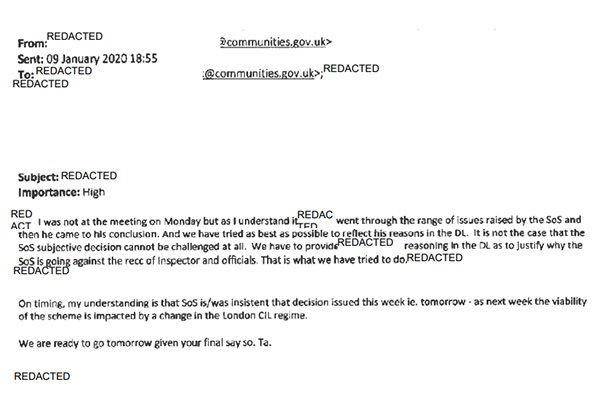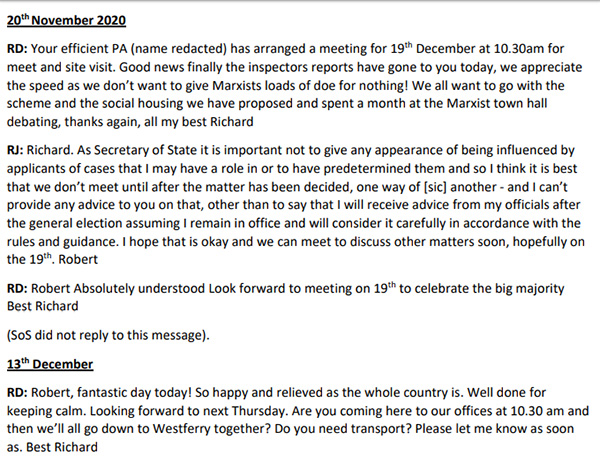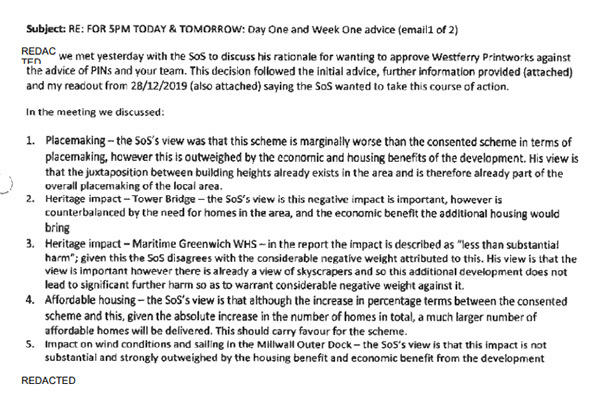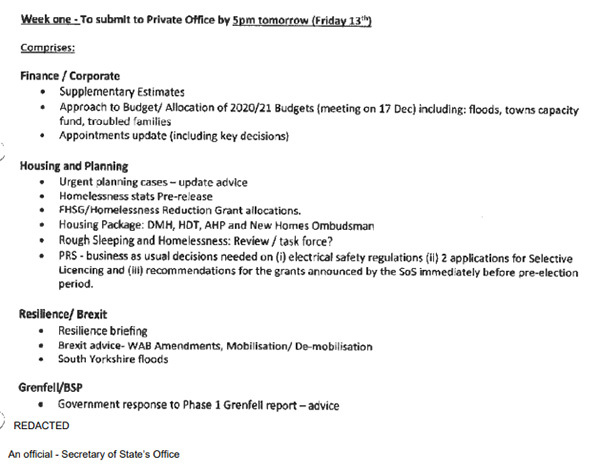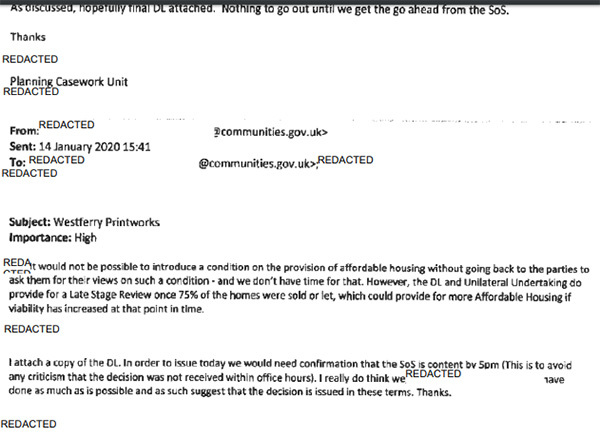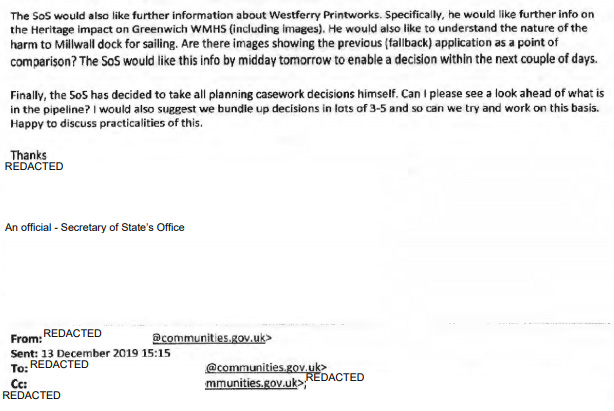You are viewing 1 of your 1 free articles
The Westferry Printworks papers: seven things we learned
Inside Housing takes a deep dive into the government papers that reveal the true nature of the relationship between Robert Jenrick and Richard Desmond, and the tale of the Westferry Printworks planning application.
Following pressure from MPs, housing secretary Robert Jenrick last night released documents relating to his much-scrutinised planning approval for Westferry Printworks.
The explosive documents reveal several new details and leave many questions unanswered. Inside Housing has unpicked the dossier of documents and correspondence and come up with seven crucial details from the Westferry Printworks affair.
Jenrick put pressure on his civil servants to push the deal through
Emails between Ministry of Housing, Communities and Local Government (MHCLG) officials explicitly note that Mr Jenrick wanted to approve the project ahead of the introduction of Tower Hamlets’ Community Infrastructure Levy (CIL), which would have cost developer Richard Desmond, the owner of the Printworks site, £40m.
One email said: “On timing, my understanding is that the SoS [Secretary of State] is/was insistent that decision issued this week ie tomorrow – as next week the viability of the scheme is impacted by a change in the London CIL regime.”
Texts between Mr Desmond and Mr Jenrick reveal that both men were aware of the implications of coming to a decision early. Two days after sharing a table at a Conservative Party fundraiser, Mr Desmond texted Mr Jenrick to say: “We appreciate the speed, as we don’t want to give Marxists loads of doe [sic] for nothing!”
This rationale would prove fatal for the project, as Mr Jenrick later signed a consent order accepting ‘apparent bias’ on the timing of the decision and conceded that it should be quashed.
Jenrick initially intended to visit the site with Desmond but cancelled over concerns about how it would look
On 19 November 2019, a day after the two men shared a dinner table, Mr Jenrick forwarded a request from Mr Desmond’s secretary to meet with the billionaire developer, saying “Could you contact this lady and set up a meeting with Richard Desmond, owner of the Express newspaper, Thanks Robert.”
(Desmond had sold both the Daily Express and Sunday Express to Trinity Mirror in 2018.)
A meeting and site visit were arranged for exactly one month’s time on 19 December and Mr Desmond texted Mr Jenrick on 20 November to tell him the good news – but his expectations were dashed by the cabinet secretary.
Mr Jenrick responded: “As Secretary of State, it is important not to give any appearance of being influenced by applicants that I may have a role in or to have predetermined them and so I think it is best that we don’t meet up until after the matter has been decided, one way of [sic] another – and I can’t provide any advice to you on that, other than to say I will receive advice from my officials after the general election, assuming I remain in office and will consider it carefully in accordance after rules and guidance.
The housing secretary did take advice from his officials but later went against it, as he did for the council and the planning inspector.
Jenrick accepted five criticisms of the scheme but didn’t consider them a barrier to development
In the run up to his decision, he addressed point by point various criticisms of the scheme, acknowledging them all, but decided that none outweighed the need for additional housing.
Among issues that Mr Jenrick did not consider a barrier to the project were concerns about how tall buildings would affect the local area, a reduction in the percentage of affordable homes included in the project compared to the initial plan put forward in 2016 and the impact towers would have on sailing conditions around Millwall Outer Dock.
MHCLG officials noted that these aspects of the application meant the decision was open to challenge.
One official wrote in an email: “It is not the case that the SoS’s subjective decision cannot be challenged at all. We have to provide [redacted] reasoning in the [decision letter] as to justify why the SoS is going against the recc [sic] of inspector and officials. This is what we have tried to do.”
Jenrick initiated conversation via text after ‘refusing’ to discuss Westferry at dinner
The housing secretary told the House of Commons on 15 June that when Mr Desmond brought up the application at dinner, he said: “I advised the applicant that I was not able to discuss it.”
This contradicts Mr Desmond’s admission to The Sunday Times that he showed Mr Jenrick a promotional video for Westferry Printworks for around three to four minutes.
This week, Mr Jenrick told the Commons: “[Desmond] said that he showed me part of the video and I do not recall exactly what happened, but he did bring out his iPhone and show me some images of the development.”
Speculation remains as to what was discussed at the dinner but the text message trail released on Wednesday shows that Mr Jenrick initiated a conversation with Mr Desmond that night.
“Good to spend time with you tonight Richard. See you again soon I hope. Robert Jenrick,” the text read.
Desmond responded: “Thanks Robert I really appreciate your text will call your office tomorrow to arrange very best Richard.”
Two days later, Mr Desmond texted Mr Jenrick to say a meeting and site visit had been arranged.
Westferry made it onto a list of business for the first week back after the election
In an email sent on 12 December – a day before the general election – officials included “urgent planning cases” in a briefing for the returning or incoming housing secretary to look at in the first week back.
Other issues on that list included consideration of Homelessness Reduction Grants for councils, as well as the government’s response to the report from the first phase of the Grenfell Tower Inquiry and the South Yorkshire floods.
After a Conservative win at the election, Mr Jenrick returned to his post, prompting a congratulatory message from Mr Desmond in which he sought to arrange a site visit.
Mr Jenrick declined because he had to attend the Queen’s Speech in parliament but promised the two would “meet up soon”, adding: “I will look at the advice regarding the application this week.”
Wrangling over affordable housing numbers lasted until hours before the final decision
The issue of the proportion of affordable housing at Westferry Printworks has long been a subject of debate, with the percentage falling from 35% in the original 700-home plan in 2016 to 21% in the 1,500-home revised plan submitted in 2018.
Emails between officials from 14 January 2020 reveal that concerns over the amount of affordable housing lasted until the day before the final decision was made.
“What options do we have around the [affordable housing] point? Can we impose a condition that the developer must look to increase the [affordable housing] within the scheme?” one email reads.
The response, which came 20 minutes later, said: “It would not be possible to introduce a condition on the provision of the affordable housing without going back to the parties to ask them for their views on such a condition – and we don’t have time for that.”
In his recovered appeal document, Mr Jenrick acknowledged that the 21% on offer did not represent the “maximum reasonable amount of affordable housing” and therefore was in conflict with the London Plan.
However, an official’s email explains the reasoning behind his decision: “The SoS’s view is that although the increase in percentage terms between the consented scheme and this, given the absolute increase in the number of homes total, a much larger number of affordable homes will be delivered. This should carry favour for the scheme.”
Jenrick chose to take the decision himself and not pass on to his ministerial team
The day after the election, MHCLG officials began pulling together a number of urgent planning cases for the incoming housing secretary.
In an email marked as ‘high importance’, officials shared the outstanding planning decisions, of which Westferry Printworks was one, and said: “The secretary of state may wish to decide these cases himself or pass them to his ministerial team.”
Days later, on 17 December, one of Mr Jenrick’s officials responded: “The SoS has decided to take all planning casework decisions himself.”
That email came two days after the housing secretary had promised Mr Desmond via text to “look at the advice regarding the application this week”.
Aside from the Westferry Printworks debacle, the government had been considering a shake-up of the planning system which would have handed Mr Jenrick more power over the country’s planning system in the form of development corporations with power to take planning decisions usually made by local councils. But reports from The Daily Telegraph suggest these plans are now on hold.
It coincides with Mr Jenrick endorsing a Policy Exchange thinktank report in which he vows to simplify the country’s “overly bureaucratic planning process”.




